Alan turing - Study guides, Class notes & Summaries
Looking for the best study guides, study notes and summaries about Alan turing? On this page you'll find 69 study documents about Alan turing.
All 69 results
Sort by
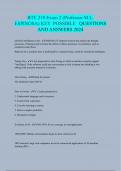
-
BTE 210 Exam 2 (Professor M.L. ESPINOSA) KEY POSSIBLE QUESTIONS AND ANSWERS 2024
- Exam (elaborations) • 20 pages • 2024
-
- $8.49
- + learn more
artificial intelligence (AI) - Subfield of Computer Science that studies the thought processes of humans and recreates the effects of those processes via machines, such as computers and robots. Behavior by a machine that, if performed by a human being, would be considered intelligent. Turing Test - A test proposed by Alan Turing in which a machine would be judged "intelligent" if the software could use conversation to fool a human into thinking it was talking with a person instead of...
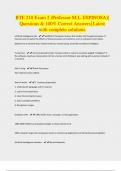
-
BTE 210 Exam 2 (Professor M.L. ESPINOSA)| Questions & 100% Correct Answers| Latest with complete solutions
- Exam (elaborations) • 21 pages • 2024
-
- $10.49
- + learn more
artificial intelligence (AI) -Subfield of Computer Science that studies the thought processes of humans and recreates the effects of those processes via machines, such as computers and robots. Behavior by a machine that, if performed by a human being, would be considered intelligent. Turing Test -A test proposed by Alan Turing in which a machine would be judged "intelligent" if the software could use conversation to fool a human into thinking it was talking with a person instead of a m...
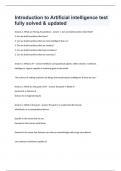
-
Introduction to Artificial intelligence test fully solved & updated
- Exam (elaborations) • 16 pages • 2024
-
- $16.49
- + learn more
Session 1: What are the big AI questions 1. Can we build machines that think? 2. Can we build machines that learn? 3. Can we build machines that are more intelligent than us? 4. Can we build machines that are creative? 5. Can we build machines that have emotions? 6. Can we build machines that are conscious? Session 1: What is AI? Artificial: Computational agents, either robotic or software. Intelligence: Agents capable of achieving goals in the world. "the science of making ma...
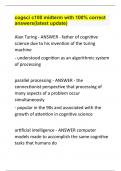
-
cogsci c100 midterm with 100% correct answers(latest update)
- Exam (elaborations) • 39 pages • 2024
-
- $14.99
- + learn more
Alan Turing - father of cognitive science due to his invention of the turing machine - understood cognition as an algorithmic system of processing parallel processing - the connectionist perspective that processing of many aspects of a problem occur simultaneously - popular in the 90s and associated with the growth of attention in cognitive science artificial intelligence computer models made to accomplish the same cognitive tasks that humans do machine learning a subs...
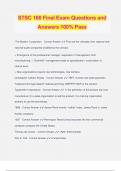
-
STSC 160 Final Exam Questions and Answers 100% Pass
- Exam (elaborations) • 18 pages • 2024
- Available in package deal
-
- $12.49
- + learn more
STSC 160 Final Exam Questions and Answers 100% Pass The Modern Corporation - Correct Answer ️️ -First are the railroads; then regional and national-scale companies enabled by the railroad. > Emergence of the professional manager; separation of management from manufacturing. > "Scientific" management leads to specialization, routinization of clerical work. > New organizations require new technologies, new workers. Christopher Latham Sholes - Correct Answer ️️ -1867: inv...
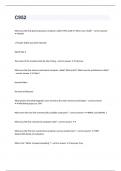
-
C952 with complete solutions
- Exam (elaborations) • 4 pages • 2024
- Available in package deal
-
- $11.49
- + learn more
C952What was the first general-purpose computer called? Who built it? When was it built? - correct answer ENIAC J. Presper Eckert and John Mauchly World War II The name of the machine built by Alan Turing - correct answer Colossus What was the first electro-mechanical computer called? Who built it? What was the architecture called? - correct answer Mark-I Howard Aiken Harvard architecture What project invented Magnetic cores served as the main memory technology? - correct an...
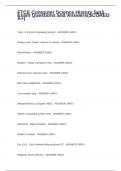
-
FTCE Computer Science History Set3 Exam Questions and Answers(SCORED A+)
- Exam (elaborations) • 8 pages • 2024
- Available in package deal
-
- $10.99
- + learn more
Telex - First text messaging system - ANSWER-1930's Relays used "Gates" opened or closed - ANSWER-1930's World Brains - ANSWER-1930's Model K - Basic Computer Chip - ANSWER-1930's Robotics term used 1st time - ANSWER-1940's Bell Labs established - ANSWER-1940's 1st computer bug - ANSWER-1940's Atanasoff Berry Computer (ABC) - ANSWER-1940's ENIAC Computing system built - ANSWER-1940's Whirlwind - flight simulator - ANSWER-1940's Modem Created - ANSWER-194...
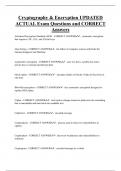
-
Cryptography & Encryption UPDATED ACTUAL Exam Questions and CORRECT Answers
- Exam (elaborations) • 3 pages • 2024
-
- $8.49
- + learn more
Cryptography & Encryption UPDATED ACTUAL Exam Questions and CORRECT Answers Advanced Encryption Standard (AES) - CORRECT ANSWER- symmetric encryption that requires 128-, 192-, and 256-bit keys Alan Turing - CORRECT ANSWER- the father of computer science and broke the German Enigma Code Machine asymmetric encryption - CORRECT ANSWER- uses two keys, a public key and a private key, to encrypt and decrypt data
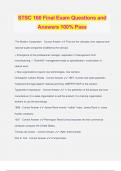
-
STSC 160 Final Exam Questions and Answers 100% Pass
- Exam (elaborations) • 18 pages • 2024
- Available in package deal
-
- $12.49
- + learn more
STSC 160 Final Exam Questions and Answers 100% Pass The Modern Corporation - Correct Answer ️️ -First are the railroads; then regional and national-scale companies enabled by the railroad. > Emergence of the professional manager; separation of management from manufacturing. > "Scientific" management leads to specialization, routinization of clerical work. > New organizations require new technologies, new workers. Christopher Latham Sholes - Correct Answer ️️ -1867: inv...
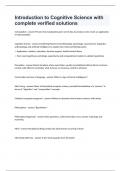
-
Introduction to Cognitive Science with complete verified solutions
- Exam (elaborations) • 5 pages • 2024
-
- $15.49
- + learn more
Computation Process that manipulates given set of data to produce some result; an application of representation Cognitive Science Combining theories from philosophy, psychology, neuroscience, linguistics, anthropology, and artificial intelligence to explain how mind and thinking works -> Application: robotics, education, decision support, health/mental illness -> Form new hypotheses and design experiments and computational models to validate hypothesis Brainpower Read ...

That summary you just bought made someone very happy. Also get paid weekly? Sell your study resources on Stuvia! Discover all about earning on Stuvia


